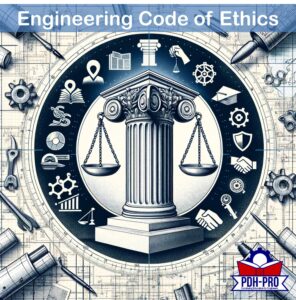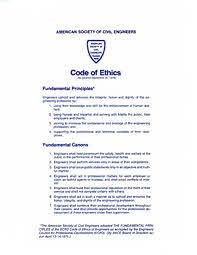All Engineers Follow a Code of Ethics
Table of Contents
Codes of ethics are guiding principles established to set a standard of conduct in society. They help them maintain honesty and integrity in the society by enforcing morality and humanity. All professionals in their capacity have their standard code of ethics that helps them maintain that standard of conduct.
To put it briefly, an engineering code of ethics is a set of principles that establishes professional conduct and moral guidelines that professional engineers (PEs) are obligated to follow. Like general codes of ethics or guiding principles established to set a standard of conduct in society, these principles require engineers to protect public safety, put the interests of clients and employers ahead of their own, and conduct themselves in an honest and ethical manner at all times.
The engineering code of ethics helps foster public trust in the engineering profession, which allows engineers to innovate and develop new technologies to improve our modern society. This article explains more about what we’re referring to and why engineering ethics are an invaluable part of the profession and how PEs can develop their knowledge through continuing education.
Ethics in Engineering
Just like any other profession, engineers need guidelines and standards to help them conduct themselves ethically in the performance of their jobs.
What is the Engineering Code of Ethics?
 The engineering code of ethics is a set of guiding principles that establish standards of behavior and moral guidelines for professional engineers in their line of duty. Every state engineering board requires ethical engineers to follow their code to protect the public and ensure engineers perform their services in an ethical and honest manner. All national engineering societies, such as NSPE, IEEE, ASCE, ASME, AAES, ABET, and AICTE, have their own code of ethics that members are obligated to follow.
The engineering code of ethics is a set of guiding principles that establish standards of behavior and moral guidelines for professional engineers in their line of duty. Every state engineering board requires ethical engineers to follow their code to protect the public and ensure engineers perform their services in an ethical and honest manner. All national engineering societies, such as NSPE, IEEE, ASCE, ASME, AAES, ABET, and AICTE, have their own code of ethics that members are obligated to follow.
One way to think about an ethical code for engineers, which differs from other professions, is that it serves as a commitment to society and the engineering profession. Engineers are obligated to work ethically and uphold professional standards at all times.
The principles in the code of ethics protect those who rely on engineers’ work. The code is essentially a social contract that guarantees that the design was prepared by a professional who put the public’s interests first. This commitment is the foundation of public trust and confidence in the engineering profession.
Engineers are required to protect public safety by following national standards and only performing work in areas where they are competent. This ensures all work is done properly and safely. Historically, this focus on safety has produced a remarkable track record – given the thousands of engineering projects completed over the years, there are very few engineering disasters and accidents.
The primary purpose of a professional code of ethics for engineers is to protect the public and uphold professional standards. The NSPE (National Society of Professional Engineers) has created a document called “Ethics” which outlines conduct expected from any person taking up the profession of engineering.
Why Do Engineers Follow a Code of Ethics?
There are several reasons why engineers follow a code of ethics. Some of these reasons include; maintaining safety, integrity and honesty, upholding proper decision making in issues of dilemma and maintaining discretion in their jobs.
1. To Maintain Safety
The work of engineers entails working on projects that impact the lives of members of society. Many times, their work involves building structures that people use daily. Therefore, engineers need to have a code of ethics that guide them in their daily work to ensure that they uphold the best interest of society.
Engineers’ code of ethics ensures that they put the safety of the members of the society first when doing their work. It means that an engineer will work with standard and approved material and that they will follow the set engineering procedures during their career.
2. To Uphold Integrity and Honesty
Engineers, like all other professions, require integrity and honesty in their jobs. Codes of ethics enable them to be accountable for their actions. They act as guiding principles for determining what is right or wrong.
A code of ethics for engineers ensures that they remain honest in all their transactions. Even when faced with a dilemma or other pressures in their duty, when they adhere to the code of ethics, they will remain honest. By following the code of ethics, engineers can be frank with their clients, and at all times ensure that they keep the interests of the clients in mind..
3. Build Public Trust and Confidence in the Profession
Engineering codes of ethics should be considered a crucial part of the engineering profession because it helps create faith among the population that engineers are ethical people who will do what is right even when no one else is looking. It also provides assurance to others in different fields like construction, manufacturing, software development, etc., that they have someone on their side with respect to safety or quality standards.
Without these guidelines in place, every engineer would need to develop his or her own set of rules which could lead to problems such as not knowing what constitutes appropriate behavior and how important decisions should be made about design specifications without first consulting relevant stakeholders.
4. To Protect Clients and Employers
The code of ethics also ensures that engineers maintain discretion when dealing with their clients’ information. Generally, the principle of ethics places client’s personal information privileged, and engineers must ensure that that information remains so.
They should not disclose any details regarding the client such as their name, age, gender, location or even the project at hand. The engineers must preserve such information unless the client states otherwise. Likewise, the engineer should not disclose any information regarding their employer unless otherwise stated.
5. To Ensure Ethical Decision Making in Areas of Uncertainty
A dilemma or a predicament refers to a situation where there is a difficult choice to make between two or more alternatives. Dilemmas are relatively common occurrences in everyone’s lives. Occasionally, people have to make difficult decisions in life where the other options present as equally destructive.
Like all people, engineers face dilemmas in their line of duty. A code of ethics guides engineers in making these difficult decisions by ensuring that they choose what is moral. They give a clear guideline into what decision is ethical and serves the interests of the society rather than individual gain.
Fundamental Principles of Engineering Code of Ethics in More Detail

Every engineer in their line of duty is expected to:
- Uphold the safety, welfare and health of the society at all times
- Be truthful and honest when issuing public statements
- Offer their services in their areas of expertise only
- Be honest and trustful with their employers and clients
- Be honorable, responsible, lawful and ethical in their professional capacity to ensure good reputation and honor among the society
- Treat all people with fairness with respect and dignity regardless of their personality, gender, race or other personal identification issues
- Use their knowledge and skills for the improvement of humanity
- Anticipate the current needs of society and fulfill them
Every engineer has to follow and uphold these basic principles in their jobs without fail. In the event of a conflict or dilemma in fulfilling these basic codes, the engineer is bound to enforce the code based on the importance of each stakeholder.
Engineering Societies – Codes of Ethics
- National Society of Professional Engineers
Engineers have a responsibility to uphold their profession’s high standards. To do so, they must be honest and ethical in their professional conduct. This includes the following principles derived from the National Society of Professional Engineer’s (NSPE) Ethical Oath for Engineers:
- Understand that engineering work has both social and technical dimensions; use judgment to balance these different aspects when making decisions or solving problems
- Consider potential consequences – financial, environmental, societal – before acting on any matter related to one’s work as an engineer
- Ensure only qualified personnel perform tasks requiring specialized skills
- American Society of Civil Engineers
In the ASCE Code of Ethics, engineers are also obligated to:
- Adhere to all federal and state laws pertaining to engineering work activities
- Observe those practices that constitute sound professional conduct; ensure such work is accomplished in a competent manner so as not compromise life or property.
The code states that it must be understood what an engineer’s obligations represent at law before signing any contract with another party. In addition, professionals should always act honestly and ethically when dealing with other parties (such as clients). Finally, they have a responsibility not only for their own actions but also protecting public health from harm caused by products created through engineering processes.
- American Society of Mechanical Engineers
The American Society of Mechanical Engineers (ASME) code of ethics for engineers was created to promote and advance ethical practices among its members. The society’s board first began drafting such a document in 1913, which has since been revised several times. Today, this code outlines seven principles that are expected to be followed by all engineering professionals: integrity; responsibility; objectivity; fairness; confidentiality; honesty and truthfulness. These represent core values at the base of most professional codes of ethics in engineering or other fields related to STEM education.
Engineering Code of Ethics and Stakeholders
There are five key stakeholders to which engineers have a responsibility. Below is a list of these stakeholders in their order of priority:
- Society
- Natural environment
- Professionalism
- Employers and Clients
- Peers
When faced with a dilemma, an engineer should make a decision based on this list. He should place the needs of the society first, then work his way down the list as follows.
1. Engineers and Society
The engineering code of ethics places society first. It ensures that the engineers put the needs and interests of the society first before those of their employers, clients or themselves. The necessary code of ethics for engineers to society are:
- Place the safety and welfare of society first at all times;
- Improve humanity’s quality of life in their duties;
- Dispense truthful opinions that are honest, true and well-founded to the public;
- Treat all people in the society equally and fairly regardless of their identity or societal status;
- Endure no tolerance for issues of corruption, bribery, and fraud. They must report any incidences of corruption, bribery or fraud to their superiors;
- Respect social diversity and uphold these considerations in the implementation of their duties;
- Aspire to be of service following civil norms;
- Report any misconduct to their superiors or authority significantly if the wrongdoing harms the safety, health, or welfare of the society; and
- Assess the capabilities, shortcomings and inference of the existing and future technology in their line of duty.
2. Natural Environment and Engineering
The natural environment is another important stakeholder in the hierarchy. All professional engineers must protect the environment and ensure the sustainability of the environment for the society and future generations.
The necessary code of ethics for engineers to the natural environment include:
- Adhering to the laws of sustainable development at all times;
- Utilizing resources carefully, and minimizing the depletion of these resources;
- Balancing the societal, environmental and economic implications of their work; and
- Alleviate the adverse societal, economic and ecological effects to ensure that there is a balance.
3. Engineering Professionalism
Another essential stakeholder of the code of ethics for engineers is their professionalism. Engineers must respect their professions and conduct themselves professionally at all times. The necessary code of ethics for engineers to their career are:
- Conducting themselves with honor, integrity and dignity in their professional capacity;
- Ensuring that they adhere to the legal requirements during their engineering practice;
- Promote fair competition and condemn unfair competition;
- Be truthful with their professional qualifications and experience;
- Encourage mentorship and healthy knowledge sharing with current or future engineers to ensure they pass on good skills;
- Engage in professional development to ensure that they better their skills; and
- Give the public some form of education on the importance of engineering to society.
4. Employers and Clients
All engineers have to know that they are dependent on their employers or their clients to perform their duties. For this reason, they follow a code of ethics when dealing with either of these parties. They should:
- Be honest and truthful to their employers or clients at all times, and conduct themselves with integrity and honest;
- Discuss clearly with their clients or employers any existing, potential conflict of interests that may arise in their duties;
- Discuss with clarity and timeliness any issues of risk associated with the implementation of their duties;
- Keep their clients or employer’s personal information confidential;
- Provide their services only in their areas of expertise;
- Inform clients or employers of any consequences that may arise if the needs of the public are overruled; and
- Review all work products before signing, approving or sealing them to promote responsibility.
5. Peers
Finally, engineers are bound by a code of ethics when dealing with their peers. Here, the necessary regulation of ethics ensures that engineers:
- Only expect credit for their professional effort;
- Acknowledge the works and actions of other engineers;
- Ensure safety and adequate health requirements in their workplaces;
- Work with honesty and fairness in their professional capacity;
- Respect and honor other engineers during all engagements and collaborations;
- Encourage the development and education of other engineers to ensure that they maintain a reputable profession in the future;
- Enhance equality and respect in their supervision duties;
- Provide only professional comments on the nature of duties of other engineers; and
- Report any violations of the code of ethics to the relevant bodies for proper action.
Why Study Engineering Ethics?
Every professional engineer needs to study engineering ethics before they engage in any act of service. The leading reason behind this is to ensure that they uphold the interest of the above-stated stakeholders in dispensing their duties. PEs also study ethics to ensure that they maintain professionalism so that, in turn, the profession itself remains respectable.
Dilemmas in Engineering Ethics
Engineers often face dilemmas when making design decisions without first consulting relevant stakeholders. For instance, imagine an engineer working on a project to provide power for a school. Due to budget constraints, though, only one of the two heating systems can operate during the winter months. The engineer must decide which system to prioritize while aiming to maximize warmth and safety for as many people as possible. However, if the decision is inconsistent each time the issue arises, it may lack a clear ethical foundation.
By the time engineers complete their education and enter the field, they have already faced ethical decision-making. However, as their careers progress, these dilemmas become increasingly complex and nuanced. Given this complexity, there is no universal solution to every ethical challenge, requiring engineers to carefully evaluate each situation on a case-by-case basis.
Pursuing Ethics in Engineering
Engineering ethics is more than just a set of guidelines—it is a commitment to making responsible decisions that impact society, sustainability, and safety. Engineers must not only understand ethical principles but also actively apply them in real-world situations. As engineering challenges grow more complex, maintaining ethical integrity is essential in ensuring public trust and long-term progress.
PDH-Pro offers ethics & law courses designed to help engineers stay up to date with ethical standards and professional responsibilities. Our courses provide valuable insights into real-world ethical dilemmas, ensuring that engineers are well-equipped to navigate complex decisions while upholding the highest standards of professionalism.
Continuous education is key to maintaining licensure and making a meaningful impact in the field—learn more about all of our courses and webinars for professional engineers!.
